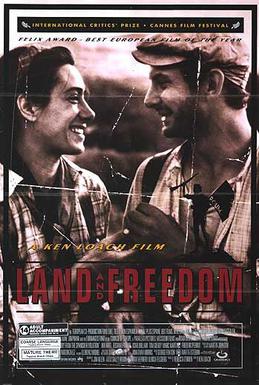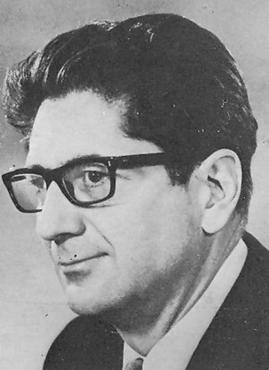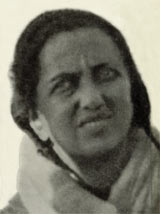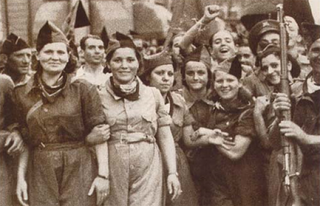Related Research Articles

Homage to Catalonia is George Orwell's personal account of his experiences and observations fighting in the Spanish Civil War for the POUM militia of the Republican army.

The Workers' Party of Marxist Unification was a Spanish communist party formed during the Second Republic and mainly active around the Spanish Civil War. It was formed by the fusion of the Trotskyist Communist Left of Spain and the Workers and Peasants' Bloc against the will of Leon Trotsky, with whom the former broke.

Andreu Nin Pérez was a Spanish communist politician, translator and publicist. In 1937, Nin and the rest of the POUM leadership were arrested by the Moscow-oriented government of the Second Spanish Republic on trumped up charges of collaborating with Francisco Franco's Nationalists and were tortured to death by Soviet NKVD agents. On 17 June 2013, 76 years after his death, the Parliament of Catalonia officially paid homage to him and his work on politics with special emphasis on his work as Justice Minister of Catalonia.
The May Days, sometimes also called May Events, refer to a series of clashes between 3 and 8 May 1937 during which factions on the Republican faction of the Spanish Civil War engaged one another in street battles in various parts of Catalonia, centered on the city of Barcelona.

Land and Freedom is a 1995 film directed by Ken Loach and written by Jim Allen. The film narrates the story of David Carr, an unemployed worker and member of the Communist Party of Great Britain, who decides to fight in the Spanish Civil War for the republicans, a coalition of Socialists, Communists and Anarchists against a nationalist coup d'etat. The film won the FIPRESCI International Critics Prize and the Prize of the Ecumenical Jury at the 1995 Cannes Film Festival. The film was also nominated for the Palme d'Or at Cannes.
The British Independent Labour Party sent a small contingent to fight in the Spanish Civil War. The contingent fought alongside the Workers' Party of Marxist Unification (POUM) and included George Orwell, who subsequently wrote about his experiences in his personal account Homage to Catalonia.
Wilebaldo Solano Alonso was a Spanish Communist activist during the Spanish Civil War, especially noted for his work with Socialist youth organizations as a member of the Workers' Party of Marxist Unification (POUM). Most of his activities before and during the Second Spanish Republic were centered in Catalonia.

Víctor Alba who also went as Pere Pagès i Elies was a Spanish anti-Stalinist communist politician, journalist, writer and Spanish university professor.

Clara Thalmann was a Swiss journalist, athlete and militiawoman, who fought during the Spanish Civil War.
Charles Andrew Orr was an American economist and socialist.
Mahlon Fay Perkins was a United States diplomat. After serving in China for many years, he was consul-general in Barcelona during the Spanish Civil War. It was his intervention which saved the lives of Charles Orr and Lois Orr after they had been arrested in the Stalinist crackdown on the Workers' Party of Marxist Unification (POUM). He visited them several times when they were in captivity, securing their release on 1 July 1937, and placing them on a ship bound for Marseilles on 3 July.
Juan Andrade Rodriguez was a Spanish communist, journalist, politician and editor.

Mika Feldman de Etchebéhère was an Argentine militant anarchist and Marxist. She served as captain of the POUM militia during the Spanish Civil War in 1936, and was also active in the anarcha-feminist organization, Mujeres Libres.

Milicianas fought in the Spanish Civil War. They came from a culture with iconic fighters, and where women had been recently empowered through direct political engagement in political organizations and labor unions. The Dictatorship of Primo de Rivera saw women take more to the streets to protest and riot, though their actions were dismissed by male political leaders. The creation of the Second Spanish Republic led to an environment encouraging active political participation in broader Spanish society, and ultimately served to assist many women in their decision to head to the front, as the Government expanded rights for women, including the right to vote, divorce, go to school and stand for election.
Women in the Workers' Party of Marxist Unification were faced with many of the same problems as other Communist and Anarchist women in the 1930s, such as hypocrisy of the male leadership in their support of women's rights, while continuing their sexist and patriarchal behavior in private.
Women in the Communist Party of Spain were highly active, the most visible figure in the movement being Dolores Ibárruri, who joined in its early years. The Dictatorship of Primo de Rivera pushed the group underground, where they had to meet clandestinely around their public face, the football club Oriente FC.
Women in the Popular Front in the Spanish Civil War were part of a broad leftist coalition founded ahead of the 1936 Spanish general elections. The Second Spanish Republic represented a changing cultural and political landscape in which women's political organizations could flourish for the first time. It failed to empower women completely, as they were often locked out of governance roles and positions in political organizations. Many organizations continued to discriminate against women, as Marxist ideology did not see them as a unique group with special needs but as part of larger class grouping in which class equality needed to be prioritized.
Women in the Spanish Civil War saw the conflict start on 17 July 1936. The war would impact women's everyday lives. Feminist solutions to problems of women in this period often took an individualistic approach. For women of the Second Republic, by close of the Civil War their efforts for liberation would fail.
Women in POUM in Francoist Spain were few as many, along with male dominated leadership, were forced into exile following the end of the Spanish Civil War. Those in exile often felt isolated and alone. Those who remained were sometimes sent to prison. POUM women participated in a hunger strike at Madrid's Las Ventas prison in 1946. The group fell by the wayside as Partido Comunista de España became the pre-dominant resistance organization in Spain. The organization finally dissolved during the 1950s in Toulouse, France with its memory kept alive by the wife of its last president, María Teresa Carbone, through the Fundació Andreu Nin.
Josep Rovira i Canals (1902–1968) was a Catalan politician, a leader of the Workers' Party of Marxist Unification. During the Spanish Civil War he managed to send several militia units to the Aragon front, and was arrested by the republican authorities in the context of the repression against the POUM.
References
- 1 2 Hochschild, Adam (2016). "A New Heaven and a New Earth". The American Scholar: 36–49 – via Proquest.
- ↑ Víctor Alba and Stephen Schwartz, Spanish Marxism versus Soviet communism: a history of the P.O.U.M., ISBN 0-88738-198-7, 1988
- ↑ Lois Orr, Letters from Barcelona: An American Woman in Revolution and Civil War, edited by Gerd-Rainer Horn, ISBN 978-0-230-52739-3, 2009
- ↑ Jeremy Harding, Paralysed by the Absence of Danger, London Review of Books, 31(18), 2009